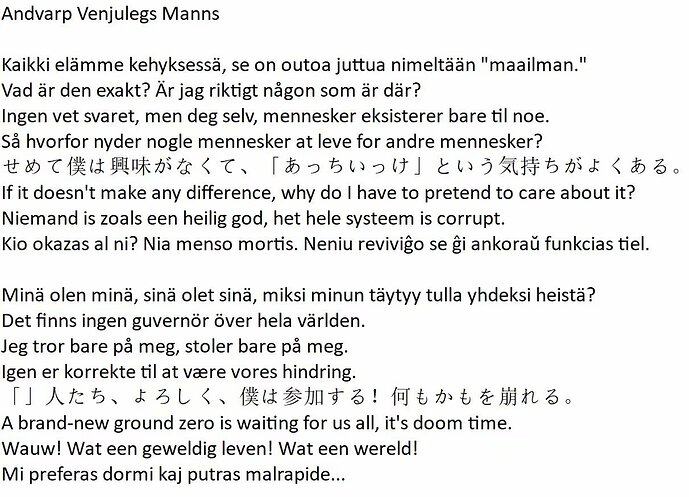- the Japanese haikus, romaji and English translation included
written during 2012-2014
original translation is in Chinese, I added English one just now.
『無き闘争歌』
naki tousouka
(haikus of endless struggle)
前言
zengen
(prologue)
心のみ
kokoro nomi
戦いの場所
tatakai no basho
終わらせる
owaraseru
(only heart, is the place to fight, let there be none.)
其の壱
sono ichi
(chapter 1)
揺れる月
yureru tsuki
其の輝きが
sono kagayaki ga
強く照る
tsuyoku teru
地も銀に染め
chi mo gin ni some
身も白になる
mi mo shiro ni naru
(dazzling moon, it shone strongly. the land was dyed in silver, and my body changed to pure white.)
其の弐
so no ni
(chapter 2)
奈落には
naraku ni wa
泣き声一つ
nakigoe hitotsu
響くなら
hibiku nara
腐敗の命
fuhai no inochi
振れるんだろう
furerun darou
(in the hell, there’s a crying voice. if it kept making sound, decayed life would be moved.)
其の裏
sono ura
(hidden chapter)
枯れた草
kareta kusa
変われる花が
kawareru hana ga
いつか咲く?
itsuka saku
叫びの日まで
sakebi no hi made
昨夜も来ない
sakuya mo konai
(shrivelled grass, should eventually become a flower, and when it shall blossom? until the screaming day, last night shall never come.)
其の参
sono san
(chapter 3)
忘れる日
wasureru hi
届かぬ思ひ
todokanu omohi
何処へ行く?
doko e iku
(forgotten days, inexpressible desire [or miss], where did they go?)
其の死
sono shi
(chapter 4, 死 means death but has the same pronunciation of 4 in Japanese.)
幻惑め
genwaku me
明け星流れ
akeboshi nagare
時離せ*
tokihanase
*the same as 「解放せ」here, it’s a kind of rhetoric in haiku.
(like a dream, the universe is moving, time also goes by. [it’s time to liberate.])
其の冴
sono go
(chapter 5, 冴 means coldness but has the same pronunciation of 5 in Japanese.)
闇の部屋
yami no heya
幻光
maboroshi hikari
凍てるから
iterukara
自らために
mizukara tameni
窓裏に描け
madoura ni kake
殻に堕ち
kara ni ochi
吾が魂も
wa ga tamashii mo
(a ray of dream light pierced in the dark room. it painted ? on my soul and deceased body. “?” means anything you want, this is another rhetoric, if you don’t add “?” in the translation that won’t make sense.)
其の肋
sono roku
(chapter 6, 肋 means rib but has the same pronunciation of 6 in Japanese.)
全て消し
subete keshi
徒「 」*抱き
tada kakko daki
一人斬り **
hitori kiri
*「 」means blank and has a similar pronunciation of “the past”.
**一人斬り actually also means “slash a person”. {I guess Vidoll fans will understand.}
(if [you] want to delete everything, only blank [the past] shall remain, and you shall be the only lonely one.)
其の死地
sono shichi
(chapter 7, 死地 means place of the dead but has the same pronunciation of 7 in Japanese.)
志
kokorozashi
刈る気を込めて
karu ki wo komete
独りだけ
hitori dake
飛べる彼方へ
toberu kanata e
空白の上*
kuuhaku no kami
*上 means above, using “kami” also indicates 神 “god”, which has the same pronunciation, again.
(for the sake of ambition, [only you] lost everything. [you] shall fly above to the other bank of the blank [river] at last.)
I think I’ll show my Chinese poems soon.


 but this is true, all kinds of rumors are always flying all over the country without scientific evidence. what’s sad is, many ppl (especially the elders) believe them and spread out the words, even push against the truth. the dark feudal time really killed ppl’s pure mind I have to say. and that’s why I complaint a lot and wrote ironic stuffs.
but this is true, all kinds of rumors are always flying all over the country without scientific evidence. what’s sad is, many ppl (especially the elders) believe them and spread out the words, even push against the truth. the dark feudal time really killed ppl’s pure mind I have to say. and that’s why I complaint a lot and wrote ironic stuffs. 

